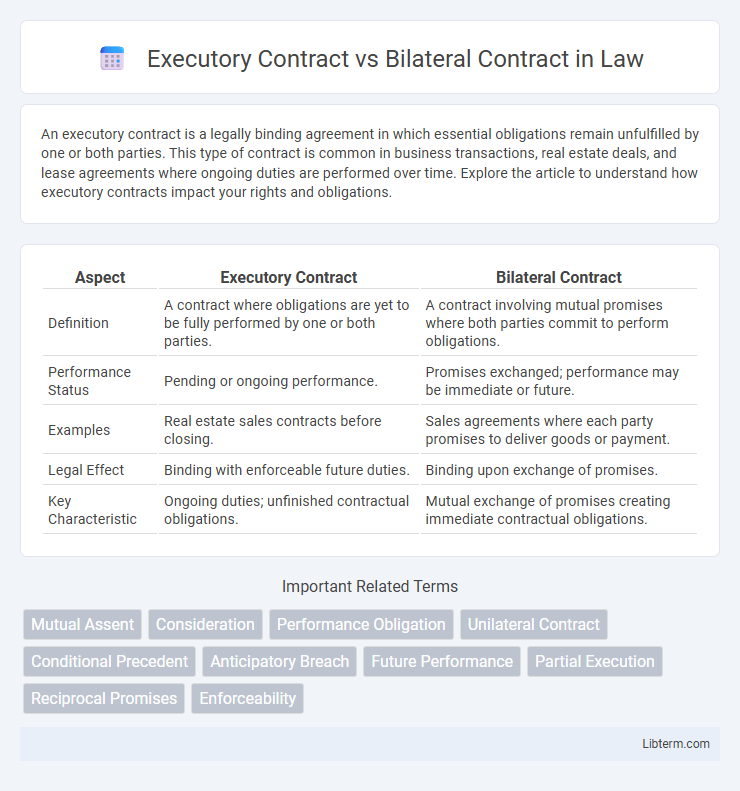An executory contract is a legally binding agreement in which essential obligations remain unfulfilled by one or both parties. This type of contract is common in business transactions, real estate deals, and lease agreements where ongoing duties are performed over time. Explore the article to understand how executory contracts impact your rights and obligations.
Table of Comparison
| Aspect | Executory Contract | Bilateral Contract |
|---|---|---|
| Definition | A contract where obligations are yet to be fully performed by one or both parties. | A contract involving mutual promises where both parties commit to perform obligations. |
| Performance Status | Pending or ongoing performance. | Promises exchanged; performance may be immediate or future. |
| Examples | Real estate sales contracts before closing. | Sales agreements where each party promises to deliver goods or payment. |
| Legal Effect | Binding with enforceable future duties. | Binding upon exchange of promises. |
| Key Characteristic | Ongoing duties; unfinished contractual obligations. | Mutual exchange of promises creating immediate contractual obligations. |
Understanding Executory Contracts
An executory contract is an agreement where both parties still have important obligations to perform, distinguishing it from bilateral contracts where mutual promises are exchanged upfront. In legal and business contexts, executory contracts remain partially unfulfilled, such as ongoing service agreements or installment sales contracts. Understanding the executory nature of a contract is crucial for managing risks, enforcing terms, and handling breaches effectively.
Defining Bilateral Contracts
A bilateral contract is a mutual agreement where both parties exchange promises to perform future acts, creating reciprocal obligations immediately upon formation. Unlike executory contracts, which refer to agreements where the obligations are yet to be fully performed, bilateral contracts establish binding commitments from both sides at the outset. This type of contract is fundamental in commercial law, as it ensures enforceability based on the simultaneous exchange of promises rather than completed actions.
Key Characteristics of Executory Contracts
Executory contracts are agreements in which both parties still have significant performance obligations remaining, distinguishing them from bilateral contracts where mutual promises are exchanged but performance may be complete or ongoing. Key characteristics of executory contracts include unfinished duties by both parties, ongoing obligations that must be fulfilled in the future, and the potential for modification or termination before complete performance. This ongoing performance requirement makes executory contracts crucial in fields like real estate, construction, and business transactions where conditional obligations are common.
Main Features of Bilateral Contracts
Bilateral contracts involve mutual promises between two parties where each party commits to fulfilling their obligations, creating a binding agreement upon exchange of promises. The main features include the presence of two parties, reciprocal obligations, and enforceability once promises are exchanged. Unlike executory contracts, bilateral contracts are formed immediately upon agreement, with performance typically due at a later time.
Executory Contract vs Bilateral Contract: Core Differences
Executory contracts are agreements where both parties still have significant performance obligations pending, while bilateral contracts involve mutual promises with each party immediately bound to perform. The core difference lies in execution status: executory contracts remain partially unfulfilled, whereas bilateral contracts are formed upon mutual promise exchange, though performance may be concurrent or sequential. Understanding this distinction is crucial for contract enforcement and remedies in contract law.
Legal Implications of Each Contract Type
Executory contracts, where obligations remain unfulfilled by one or both parties, carry legal implications such as potential breach claims and specific performance enforcement until duties are completed. Bilateral contracts, involving mutual exchange of promises, create immediate legal obligations enabling parties to seek remedies like damages upon breach. Understanding these distinctions is crucial for determining enforceability, risk allocation, and remedial measures under contract law.
Common Examples in Business and Law
Executory contracts in business often include leases and service agreements where obligations are ongoing and unfulfilled, while bilateral contracts commonly comprise sales agreements and employment contracts involving mutual promises executed immediately. In legal practice, executory contracts are prevalent in merger agreements pending closing conditions, contrasting with bilateral contracts like purchase orders and licensing agreements that are effective upon signing. Understanding these distinctions aids in managing contractual obligations and risk exposure in commercial transactions.
Enforceability of Executory and Bilateral Contracts
Executory contracts involve obligations that have yet to be fully performed by one or both parties, making their enforceability contingent on future actions or performances. Bilateral contracts, characterized by mutual promises exchanged between parties, are enforceable once both parties have made their commitments, even if actual performance is pending. Enforceability in executory contracts depends on the existence of valid consideration and the readiness or performance of contractual duties, while bilateral contracts remain binding due to the reciprocal promise structure established at the time of agreement.
Risks and Benefits for Parties Involved
An executory contract involves ongoing obligations yet to be fulfilled by one or both parties, increasing the risk of non-performance and potential breach but allowing flexibility and adjustment over time. Bilateral contracts, where both parties exchange mutual promises immediately binding, reduce uncertainty by clearly defining duties upfront but may limit adaptability if conditions change. Understanding these distinctions helps parties weigh the benefit of clear agreements against the risk of incomplete performance or changing circumstances.
Choosing the Right Contract: Factors to Consider
Choosing the right contract between an executory contract and a bilateral contract depends largely on the timing of obligations and risk allocation. Executory contracts, where both parties have outstanding duties, are ideal for ongoing projects requiring continuous performance, while bilateral contracts bind both parties immediately with clear reciprocal promises. Assess contract complexity, the need for performance certainty, and potential enforcement issues to determine which contract best aligns with project goals and legal protections.
Executory Contract Infographic

 libterm.com
libterm.com